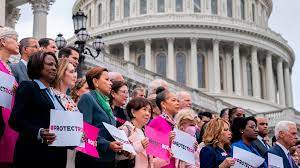 Held: The Constitution does not confer a right to abortion; Roe and Casey are overruled; and the authority to regulate abortion is returned to the people and their elected representatives. Pp. 8–79. (a) The critical question is whether the Constitution, properly understood, confers a right to obtain an abortion. Casey’s controlling opinion skipped over that question and reaffirmed Roe solely on the basis of stare decisis. A proper application of stare decisis, however, requires an assessment of the strength of the grounds on which Roe 2 DOBBS v. JACKSON WOMEN’S HEALTH ORGANIZATION Syllabus was based. The Court therefore turns to the question that the Casey plurality did not consider. Pp. 8–32. (1) First, the Court reviews the standard that the Court’s cases have used to determine whether the Fourteenth Amendment’s reference to “liberty” protects a particular right. The Constitution makes no express reference to a right to obtain an abortion, but several constitutional provisions have been offered as potential homes for an implicit constitutional right. Roe held that the abortion right is part of a right to privacy that springs from the First, Fourth, Fifth, Ninth, and Fourteenth Amendments. See 410 U. S., at 152–153. The Casey Court grounded its decision solely on the theory that the right to obtain an abortion is part of the “liberty” protected by the Fourteenth Amendment’s Due Process Clause. Others have suggested that support can be found in the Fourteenth Amendment’s Equal Protection Clause, but that theory is squarely foreclosed by the Court’s precedents, which establish that a State’s regulation of abortion is not a sex-based classification and is thus not subject to the heightened scrutiny that applies to such classifications. See Geduldig v. Aiello, 417 U. S. 484, 496, n. 20; Bray v. Alexandria Women’s Health Clinic, 506 U. S. 263, 273– 274. Rather, regulations and prohibitions of abortion are governed by the same standard of review as other health and safety measures. Pp. 9–11. (2) Next, the Court examines whether the right to obtain an abortion is rooted in the Nation’s history and tradition and whether it is an essential component of “ordered liberty.” The Court finds that the right to abortion is not deeply rooted in the Nation’s history and tradition. The underlying theory on which Casey rested—that the Fourteenth Amendment’s Due Process Clause provides substantive, as well as procedural, protection for “liberty”—has long been controversial.
Held: The Constitution does not confer a right to abortion; Roe and Casey are overruled; and the authority to regulate abortion is returned to the people and their elected representatives. Pp. 8–79. (a) The critical question is whether the Constitution, properly understood, confers a right to obtain an abortion. Casey’s controlling opinion skipped over that question and reaffirmed Roe solely on the basis of stare decisis. A proper application of stare decisis, however, requires an assessment of the strength of the grounds on which Roe 2 DOBBS v. JACKSON WOMEN’S HEALTH ORGANIZATION Syllabus was based. The Court therefore turns to the question that the Casey plurality did not consider. Pp. 8–32. (1) First, the Court reviews the standard that the Court’s cases have used to determine whether the Fourteenth Amendment’s reference to “liberty” protects a particular right. The Constitution makes no express reference to a right to obtain an abortion, but several constitutional provisions have been offered as potential homes for an implicit constitutional right. Roe held that the abortion right is part of a right to privacy that springs from the First, Fourth, Fifth, Ninth, and Fourteenth Amendments. See 410 U. S., at 152–153. The Casey Court grounded its decision solely on the theory that the right to obtain an abortion is part of the “liberty” protected by the Fourteenth Amendment’s Due Process Clause. Others have suggested that support can be found in the Fourteenth Amendment’s Equal Protection Clause, but that theory is squarely foreclosed by the Court’s precedents, which establish that a State’s regulation of abortion is not a sex-based classification and is thus not subject to the heightened scrutiny that applies to such classifications. See Geduldig v. Aiello, 417 U. S. 484, 496, n. 20; Bray v. Alexandria Women’s Health Clinic, 506 U. S. 263, 273– 274. Rather, regulations and prohibitions of abortion are governed by the same standard of review as other health and safety measures. Pp. 9–11. (2) Next, the Court examines whether the right to obtain an abortion is rooted in the Nation’s history and tradition and whether it is an essential component of “ordered liberty.” The Court finds that the right to abortion is not deeply rooted in the Nation’s history and tradition. The underlying theory on which Casey rested—that the Fourteenth Amendment’s Due Process Clause provides substantive, as well as procedural, protection for “liberty”—has long been controversial.
LINK: https://www.supremecourt.gov/opinions/21pdf/19-1392_6j37.pdf
